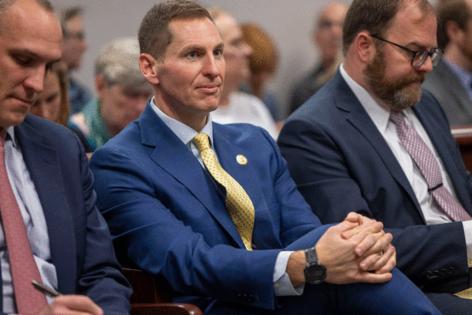North Carolina Republicans advance sweeping new elections bill. Here's what's in it
Published in News & Features
RALEIGH, N.C. — North Carolina lawmakers on Wednesday pared down an attempt to convert a wide swath of the State Board of Elections nonpartisan civil service staff into political appointees — advancing an amended elections bill that still includes significant changes to voter ID, ballot counting deadlines, ranked choice voting and more.
Many of the changes appear motivated by Jefferson Griffin’s unsuccessful six-month legal battle to overturn his loss in the 2024 state Supreme Court election and would require more registration information from voters and ban certain voters from participating in state elections.
The bill’s sponsor, Rep. Hugh Blackwell, a Burke County Republican, said the bill was still a “work in progress” and that he expected further changes before the legislation was final.
Bill pares down controversial ‘exempt’ state employees provision
Democrats had widely criticized the first draft of House Bill 958 which would have allowed the State Board of Elections’ new executive director, Sam Hayes, to make 25 positions within the agency (nearly a third of the total staff) exempt from the State Human Resources Act — allowing him to hire and fire them at will.
Rep. Phil Rubin, a Wake County Democrat, said last month when the bill got its first hearing that it would exempt the agency from “the rule that you have to hire the best person for the job and that you can’t hire and fire based on politics.”
The updated version of HB 958, which advanced in a House committee Wednesday, would instead allow Hayes to shift five employees to exempt status.
Rep. Pricey Harrison, a Guilford County Democrat, said she appreciated the reduced number of exempt positions, but noted that a provision in the already-passed “mini” budget bill already gives the board nearly $1.2 million to hire seven new exempt employees.
Blackwell said his intention was that the five exempt positions in HB 958 be included within the seven in the budget bill, not in addition to them.
Proposed changes mirror Griffin’s election challenge
Among the many proposed election changes in HB 958 are several provisions that appear to address issues raised in Griffin’s challenge of the 2024 election results.
His main argument for asking over 60,000 ballots to be thrown out was that the affected voters lacked a driver’s license number or the last four digits of a Social Security number in the state’s database. Griffin contended that these missing identification numbers could open the door to voter fraud, though he never provided any evidence of this happening.
HB 958 would require all new voters to provide their entire nine-digit Social Security number when they register to vote. It would also require the Division of Motor Vehicles to give the elections board its own records of all voters’ Social Security numbers that they have on file.
Harrison said this could raise security issues and questioned why the full number was necessary.
Blackwell responded that it was “so that we can feel more secure, more comfortable, that the identification of voters is being done accurately.”
The bill also mandates that military and overseas voters provide a photo ID in order to cast their ballot. These voters were previously exempted from the requirement, but Griffin argued the exemption was unlawful and challenged thousands of these ballots from voters in Democratic-leaning counties.
Lastly, HB 958 would ban so-called “Never Residents” from participating in state elections.
These are voters who, despite having never resided in the state, are the adult children of North Carolina residents born abroad. A bipartisan state law has granted them voting rights for over a decade, but Griffin argued that it was unconstitutional.
Under HB 958, these voters would be banned from voting in state races but could still cast their ballot for any federal elections.
Other changes to ballot counting, ranked-choice voting and more
The bill includes a grab-bag of other changes that drew praise and fierce criticism from members of the public who signed up to speak at Wednesday’s hearing.
HB 958 softens some ballot counting deadlines passed last year in Senate Bill 382, a controversial power shift bill passed in the final days of the lame duck legislature’s veto-proof Republican supermajority. It would give counties more time to count absentee and provisional ballots — though still significantly less than they had before SB 382.
HB 958 would also ban ranked choice voting statewide, a practice that has never been widely implemented in North Carolina but was recently in the news following the primary victory of Democratic socialist Zohran Mamdani in the New York City mayoral election.
“I think it’s most exciting thing to come along to support democracy,” Kathy Martin, a member of Democracy Out Loud said. “It is encouraging people to collaborate, to compromise.”
But Jim Womack, a member of a conservative election integrity group, said he supported the ban on ranked-choice voting.
“It’s so complicated, so confusing — it’s just not useful,” he said.
What other changes are in the elections bill?
Other changes to elections in the bill include:
—Clarifying that a voter’s ballot cannot be counted if they die between the time their ballot was cast and 6:30 a.m. on Election Day.
—Allowing the State Board of Elections to hire private legal counsel, rather than using state attorneys. Communications with private attorneys would be exempt from public records laws.
—Tightening up prohibitions on the acceptance of campaign contributions from foreign nationals.
—Reinstituting a pilot program to test signature verification technology for absentee ballots.
—Banning the practice of paying political petition gatherers per signature.
_____
©2025 Raleigh News & Observer. Visit newsobserver.com. Distributed by Tribune Content Agency, LLC.







Comments